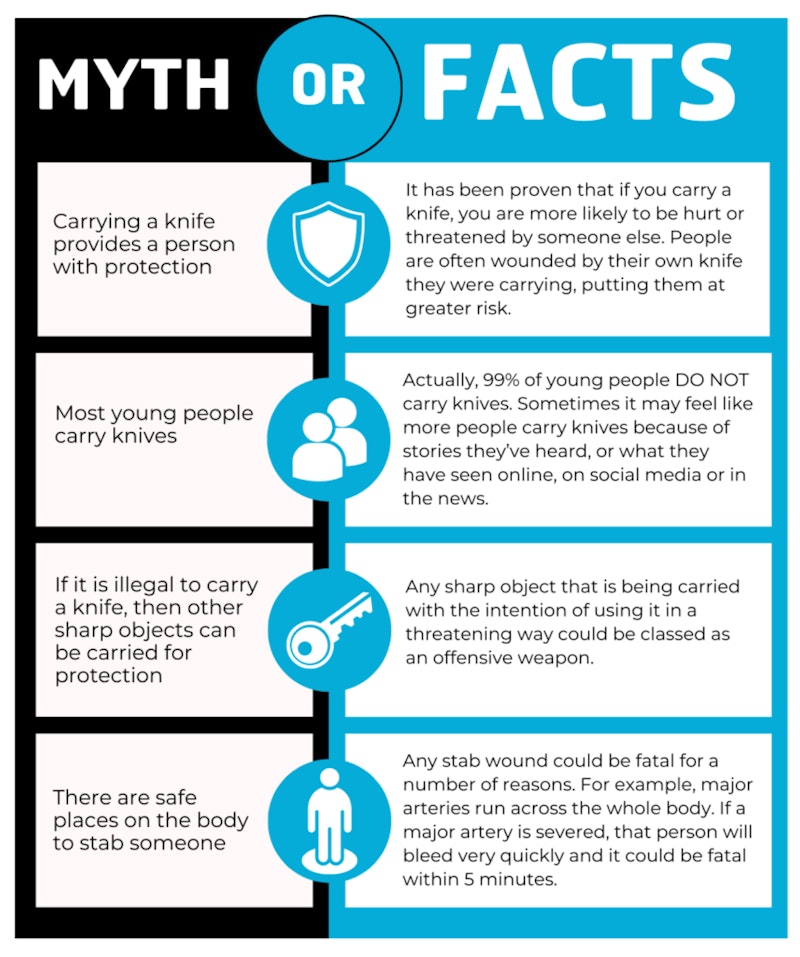In the News
Knife Crime: What Can We Do To Combat This Crisis?

11th October 2023
Knife crime surged between 2013 and 2023, prompting various interventions to address the issue.
Knife crime statistics
- Between 2013 and 2022 there was a 75% increase in knife crime.
- In the 12 months from April 2022 to March 2023, there was a 5% increase in knife crime.
- From April 2022 to March 2023 there were 50,489 Police-recorded offences involving a knife or sharp instrument.
- In the 12 months to March 2022 there were 282 murders involving a knife or sharp instrument in England and Wales, of which 99 were children and young people under 25.
What works?
The Youth Endowment Fund have looked at the evidence to determine which are the most effective approaches.
- The evidence for media awareness campaigns is considered very weak. However, not enough research has been done to truly evaluate the impact of these campaigns.
- The evidence for knife amnesties - when people are encouraged to give up their knives, no questions asked - is limited because very few evaluations have been carried out. However, the evidence we do have suggests this may have a small impact on the number of knife crimes.
- Again, there is limited evidence on the impact of education programmes such as workshops, because thorough evaluations have not been done to assess if education reduces violent knife crimes in young people.
- One intervention that has been thoroughly evaluated and shows a high impact is the 'A&E Navigators' scheme. Read more about that below.
This does not mean that these schemes do not have value, only that we cannot be certain about their impact. What is clear from this work by the Youth Endowment Fund, is that more research is needed on knife crime interventions.
Youth work
Birmingham Says No is an example of a community youth group trying to reduce youth knife crime and violence. This organisation utilises the first hand experience of young people that have been involved in knife crime to get their message across. The organisation brings together young people in a safe environment to express themselves through music, dance, poetry and other activities. They hold events across the city to talk about knife crime and youth violence. Their team consists of professionals, youth mentors, ex gang members, reformed criminals, bereaved parents and of course young people who also help to organise and support events.
He carried a blade until he was 16, and now the 21-year-old's working to educate people about the risks and steer others away from violence.
Workshops
Organisations like the Ben Kinsella Trust run workshops for children and young people. These workshops use storytelling and an immersive experience to educate young people on the consequences of knife crime and empower them to make safer decisions.
I learnt about the consequences of being involved in knife crime, to the point where I feel that I can pass on my knowledge about it to someone who might not know.
Reporting
Fearless is the youth division of the charity Crimestoppers.
Fearless is a site where you can access non-judgemental information and advice about crime and criminality. What makes this site different is we also provide you with a safe place to give information to us about crime - 100% anonymously.
Fearless are completely independent of the police and the police will not contact anyone making a report to them, as they will have no way of knowing the information came from. Reporting your concerns or knowledge of criminal activity is really important, as it helps to make communities safer and can help to solve crimes.

You might also like

The unexpected items that foodbanks need
29th July 2022

A-level results: Deaf students 'proud' after Covid mask struggles
6th September 2022

Too much of a small thing - microplastics in the human body
23rd September 2022

Diphtheria cases in people seeking asylum in the UK
1st December 2022

The complicated picture of obesity
17th March 2023

Is vaping harmful to your health and to the environment?
12th October 2023